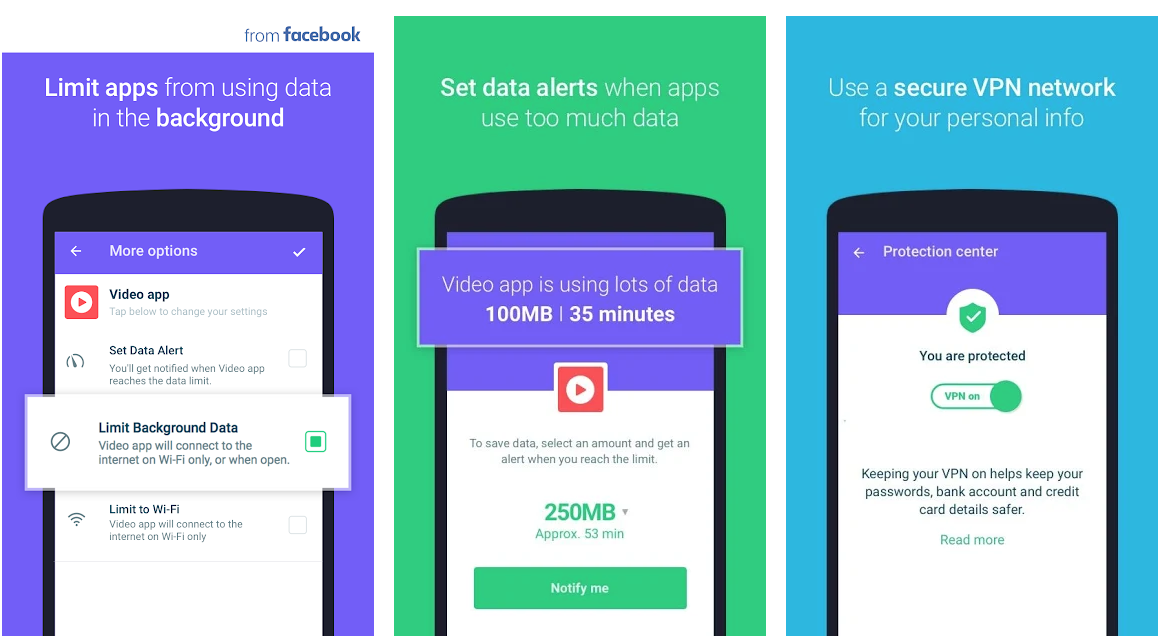Facebook will close its spyware VPN Onavo

At the end of January , news appeared on Habré that Facebook had been conducting the secret Atals project for two years. Within its framework, volunteers were paid $ 20 per month for installing a certain pseudo-VPN on the smartphone, an application that installs a root certificate and then monitors the user's actions.
Journalists during the investigation found that spyware VPN is based on Onavo Protect application code blocked in the AppStore. The application comes with a root certificate, it has the ability to intercept "private messages on social media, chats in instant messaging applications, including photos / videos sent to others, emails, web search, browsing the web and current location information ". Now it became known that the company will complete the work of Onavo.
The completion of the work involves the termination of the use of user data - they will no longer be provided to marketers from interested companies.
Also, the social network stops recruiting new volunteers for its project. Earlier they were offered “paid surveillance” through the applicationFacebook Research , which continued to be distributed through the Google apps directory (as mentioned above, Apple blocked the program).

However, the Facebook Research application will continue to work. The company will offer a transparent scheme of work - so that users understand what data they provide and what they get paid for.
Onavo was previously positioned as an application that limits the number of applications that use background data. It was also said that it provides the ability to use a "secure VPN network in exchange for your personal data." In addition, the company wrote in the conditions that Onavo VPN will collect data such as time spent using certain applications, the amount of information consumed, the list of visited sites, the user's country, device and type of network.
A Facebook spokeswoman has already announced that the social network plans to focus on paid marketing research, which means the completion of the Onavo program.
The story with Onavo began in 2013. Then, Facebook acquired the service for $ 200 million. It was stated that the social network would use the application to collect user data - namely, information about what users do with their smartphones. There is evidence that the decision to acquire WhatsApp was based, in particular, on the analysis of information received from Onavo.
At that time, the corporation positioned its VPN as a reliable way to limit traffic consumption, block dangerous websites, and also prevent attackers from stealing personal data. At the same time, the corporation analyzed the traffic of service users. Insight helped Facebook identify new trends in the use of mobile devices and focus on disarming competitors - for example, Facebook developers were well aware of what features competitors must copy.
Cloning these features has become a new social network strategy. A great example of this is the Instagram version of individual Snapchat features (namely Snapchat Stories).
All this continued for several years, until Onavo was suspected of monitoring the personal data of users. For security reasons, the application was blocked in the AppStore.
Interestingly, the social network did not spread too much about its pay-and-give data program. You can talk about a certain level of secrecy. When the secret became apparent, Facebook said the social network never hid anything.
After a series of scandals, both large and not so big, Apple banned not only the VPN service itself, but also a number of other Facebook services and applications, some of which were used by the developers of the social network itself. The corporation also revoked the Facebook certificate, which complicated the life of the social network.
In order to protect itself and not bring the situation to blocking social network applications also in the Google directory, Facebook withdraws Onavo. But, as mentioned above, Facebook Research remains on Google Play. Now the social network is trying to whitewash itself in the eyes of users and developers of other companies, therefore, it is taking a number of steps that can help in this social network.
But without Onavo, Facebook loses a powerful tool for conducting marketing research, so now the company will have to act if not blindly, then close to that. Actually, almost all technology companies operate, conducting market research, studying the market from the outside, but Facebook for many years managed to do this from the inside. Of course, Facebook Research remains, but it's still not Onavo.
